Source: Mills Soko, The Conversation, 18 September 2020, Photo credit: New Food Magazine
As the deadline for the post-Brexit trade talks between the European Union (EU) and the United Kingdom (UK) looms, concerns have arisen as to whether the two parties will be able to conclude a deal. In terms of the Brexit divorce agreement, the UK is expected to leave the EU single market and customs union on 1 January 2021. A trade deal will govern future trade relations between the EU and the UK. The prospect of striking such a deal, however, has been thrown into doubt by the publication recently of a new controversial bill by the British government that seeks to overrule parts of the Brexit withdrawal pact.
The outcome of these talks will have implications for the South African economy, specifically trade. The EU as a regional bloc is South Africa’s largest trade partner in the world, and South Africa is the EU’s biggest trade partner in Africa.
South Africa has longstanding and extensive trade relations with the UK. Prior to exiting the EU, the UK was South Africa’s second largest trade partner, after Germany, in the EU regional community. The country is also South Africa’s fourth biggest market for exports, behind only China, Germany and the United States.
Until the UK decided to leave the EU, it traded with South Africa under an economic partnership agreement (EPA) between the EU and some member states of the Southern African Development Community (SADC). The EU-SADC EPA entered into force on 10 October 2016.
Under this agreement, the EU has fully or partially eliminated custom duties for South African exports, except for aluminium and various agricultural products.
Red more
The South African Pork Producers’ Organisation (SAPPO) coordinates industry interventions and collaboratively manages risks in the value chain to enable the sustainability and profitability of pork producers in South Africa.








